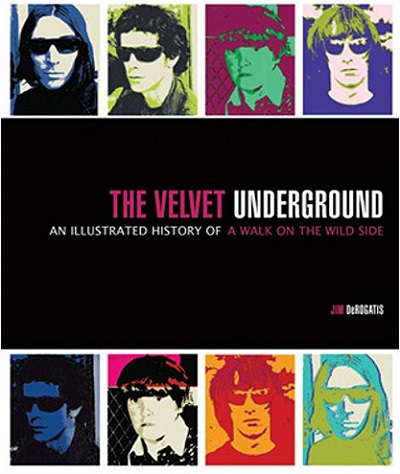By Ralph Greco, Jr.
Writer, DJ, musician and pop music critic for The Chicago Sun-Times, Jim DeRogatis is the man behind the new book, The Velvet Underground: An Illustrated History Of A Walk On The Wild Side (see my review). DeRogatis, the author of several books about music (including Let It Blurt: The Life And Times Of Lester Bangs, America’s Greatest Rock Critic), has written what I consider a quintessential read of the seminal original punk band. He was nice enough to sit down and share his thoughts on The Velvet Underground, his new book and rock criticism in general.
Tell me how the book came about.
The book began with Voyager (Voyager Press publisher). They are doing a series of big coffee table type books of rock bands and artists, and they asked me to contribute, then find other writers. As the Velvet Underground is one of favorites, it was a no brainer.
Though there are quotes from the band members from other earlier sources, you didn’t interview any of the surviving members for the book, did you?
I have interviewed Mo Tucker, John Cale and Lou Reed, but for a book of 10,000 words, to chart the history and tie together the albums, I felt the essay and the core historical overview were the most important. Besides, at the best of times, a guy like Lou Reed is a difficult interview.
Beyond their music, which may or may not suit a listener’s particular taste, what is your personal feeling about the Velvet Underground?
It struck me that three-quarters of the band grew up in Long Island in the late 50s and early 60s. Talk about a madman existence of late 50’s suburbia — all that is nice and polite and the Velvets’ railing against all that. Those are the most obvious details I feel that get overlooked when telling their story. Though I like those oft-told tales, what I wanted to do here was talk about the most common stuff that gets overlooked.
For instance, Cale was a huge influence, a very important part and usually gets the short shift because of Lou Reed. In fact, as you see in the book with that review of their first show in front of that psychiatrist convention (an infamous story), Cale was actually singled out as the front man! This tension between him and Lou is what fueled them as well as what eventually split them up. I’m very anti-idolatry to begin with and I feel that’s really what they were talking about — worshipping false idols.
When we first spoke and I mentioned how much I enjoyed the book you were quick to point out that it was a collaborative effort.
Yes, this book is a team effort. Each of the writers contributing, all the art, and I have the essay, but Voyager found stuff people haven’t seen before. And they got that whole Andy Warhol interview and the Warhol estate is notorious for not giving anything away. And the writers with me here, Greg Kot who is an aficionado of the live records and Glenn Kenny the film writer, who was perfect here since a lot of what the Velvets were about was the mutlimedia experience. Let’s just say, I am flattered Voyager thought of me to pull it all together, but the book is a collaborative effort for sure.
Looking through your background, the work you do now, with books like this and your radio show (check out www.soundopinions.org for your local stations), you are definitely championing the very best of rock criticism.
At its best, rock criticism is a dialogue, a pyramid with the artist at the top, then the fan and then the critic where ideas flow in all directions all the time. But what’s happened with the way reviews are written today, how they are distilled down to 150 word snippets, is that we have lost all of that dialogue.
You quote John Cale as saying, “Nobody understood the Velvet Underground like Lester Bangs.” With this band especially, the rock writers were so important in letting the public know who they were.
If it wasn’t for rock critics saying that a band like the Velvet Underground was important, it would have been too easy to lose sight of where the band should be placed in the whole punk movement. Any alternative punk band today owes some debt more or less to the Velvets, groups like the Stooges and the Ramones, and it’s because rock critics wrote about the Velvet Underground that we know of them.




















